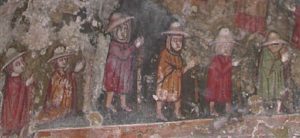Religious pluralism in Italy is spreading both as to the increasing numbers in religious minorities and the greater force with which they demand sufficient recognition of their rights in public life. The most recent (2017) Cesnur data estimate that religious minorities in Italy account for 3.5% of Italian citizens (i.e. not including resident immigrants). More specifically, Italian citizens who declare a religious identity different from the Catholic (the prevailing religion) number 1,963,900, which statistic increases to 5,861,700 with the addition of immigrants who are not citizens. Considering religious minorities only among Italian citizens (i.e. without including immigrants who are not citizens), Protestantism – with 471,300 affiliates– turns out to be the second religion, and Jehovah’s Witnesses (425,000) the third. Islam (367,100) is the fourth and Orthodox Christians (272,200) come fifth. Then follow Buddhists (179,000), New Age, Next Age and Human Potential movements and organizations (50,000), Hindus and Neo-Hindus (41,700), Jews (36,600) and Baha’i (4,300).
In addition to growing numbers of religious minorities’ members and the increasing importance of new faiths, religious pluralism in Italy is also remarkable because of a significant intra-Catholicism differentiation process. New forms of Catholic identity and belonging – on the part of subjects who re-evaluate the role of religion in national identity or re-discover traditional values as a defensive reaction to foreign religious minorities – walk side by side with traditional ones.
Many empirical studies have been devoted to the variegated nature of religious pluralism in Italy, to the public role of institutions, to the different ways in which religiosity is expressed and to relations among the various religious denominations; but few have examined new religious movement and spiritual communities which originated in Italy, especially from the 1970s onwards when the Italian New Age galaxy was taking shape. The role of new religious movements in Italy has grown as an effect of globalisation, migratory flows and the spread of new media. The role of religion and spirituality in contemporary society and political systems is, therefore, on the one hand more open to hybridization and, on the other, more glocal, with local versions of old and new faiths continuously communicating and exchanging with national and transnational religious networks.
In this Special Project we provide profiles of a number of new religions, religious movements and spiritual communities that, because of their size, histories, dynamics and activities, have been especially prominent in the Italian context. First we would like to introduce autochthonous groups, communities and new religious movements generated in Italy; and second, we shall describe the activities of international religious movements which, in Italy, assume particular characteristics.

PROFILES
- Archeosophy
- Comunità Odinista
- Cult of the Dead (Naples)
- Damanhur
- International Association of Exorcists
- La Missione- Luigia Paparelli
- Nova Cana
- Pensa e Vai
- Red Tent Movement
- Stella Azzurra
FORTHCOMING PROFILES
“Wicca in Italy”
Raffaella Di Marzio, “The Impegno e Testimonianza Movement.”
For further information, contact the Project Directors:
Dr. Stefania Palmisano (stefania.palmisano@unito.it)
Dr. Massimo Introvigne (maxintrovigne@gmail.com)
